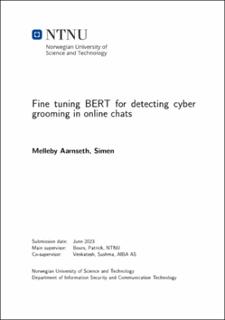| dc.description.abstract | This thesis will look into how cyber grooming may be detected through
the natural language processing model BERT, with an emphasis on the use
of abbreviations and slang present in the chats. To investigate this, several
BERT models were trained. These models where trained and tested on
different data sets consisting of a varying amount of abbreviations and
slang expressions. Through this, BERTs ability to detect cyber grooming
based on the prevalence of abbreviations and other informal language
forms could be assessed. The findings from this process indicated that
BERT was able to detect cyber grooming at a similar rate between data
sets where the prevalence of abbreviations and slang was much higher
in one compared to the other. This indicated that BERT possesses the
ability to understand language quite well despite it being in a more
informal form. | |
